Related Research Articles

Monty Python's Life of Brian is a 1979 British comedy film starring and written by the comedy group Monty Python. It was directed by Jones. The film tells the story of Brian Cohen, a young Jewish-Roman man who is born on the same day as—and next door to—Jesus, and is subsequently mistaken for the Messiah.
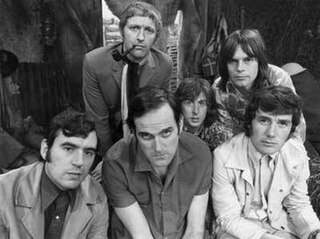
Monty Python were a British comedy troupe who created the sketch comedy television show Monty Python's Flying Circus, which first aired on the BBC in 1969. Forty-five episodes were made over four series. The Python phenomenon developed from the television series into something larger in scope and influence, including touring stage shows, films, albums, books and musicals. The Pythons' influence on comedy has been compared to the Beatles' influence on music. Regarded as an enduring icon of 1970s pop culture, their sketch show has been referred to as being "an important moment in the evolution of television comedy".
"Bruces' Philosophers Song", also known as "The Bruces' Song", is a Monty Python song written and composed by Eric Idle that was a feature of the group's stage appearances and its recordings.

Sir Michael Edward Palin is an English actor, comedian, writer, television presenter, and public speaker. He was a member of the Monty Python comedy group. Since 1980, he has made a number of travel documentaries.

Eric Idle is an English actor, comedian, musician and writer. Idle was a member of the British surreal comedy group Monty Python and the parody rock band The Rutles, and is the writer of the music and lyrics for the Broadway musical Spamalot.

"The Lumberjack Song" is a comedy song by the comedy troupe Monty Python. The song was written and composed by Terry Jones, Michael Palin, and Fred Tomlinson.

Neil James Innes was an English writer, comedian and musician. He first came to prominence in the pioneering comedy rock group Bonzo Dog Doo-Dah Band and later became a frequent collaborator with the Monty Python troupe on their BBC television series and films, and is often called the "seventh Python" along with performer Carol Cleveland. He co-created the Rutles, a Beatles parody/pastiche project, with Python Eric Idle, and wrote the band's songs.
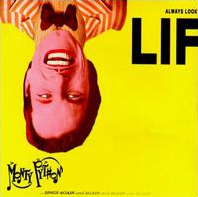
"Always Look on the Bright Side of Life" is a comedy song written by Monty Python member Eric Idle that was first featured in the Python film Life of Brian and has gone on to become a common singalong at public events such as football matches as well as funerals.
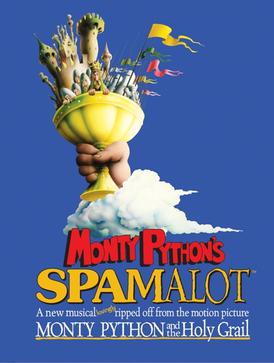
Spamalot is a musical comedy with music by John Du Prez and Eric Idle, and lyrics and book by Idle. It is adapted from the 1975 film Monty Python and the Holy Grail.

The Bruces sketch is a comedy sketch that originally appeared in a 1970 episode of the television show Monty Python's Flying Circus, episode 22, "How to Recognise Different Parts of the Body", and was subsequently performed on audio recordings and live on many occasions by the Monty Python team.
"FCC Song" is a deliberately controversial and explicit song by British-born Monty Python comic Eric Idle. Idle, who later became a resident of the U.S. state of California, recorded the song in early 2004 in reaction to a fine by the U.S. Federal Communications Commission (FCC) for saying "fuck" on a radio station. The song is also known by its refrain "fuck you very much". Despite being nominally aimed at the FCC, the lyrics primarily target well-known figures associated with the George W. Bush administration, including Dick Cheney and John Ashcroft among others. Idle stated about the song that

"Galaxy Song" is a Monty Python song written by Eric Idle and John Du Prez.

Rutland Weekend Television (RWT) was a television sketch show on BBC2, written by Eric Idle with music by Neil Innes. Two series were broadcast, the first consisting of six episodes in 1975, and the second series of seven episodes in 1976. A Christmas special was broadcast on Boxing Day 1975.

Monty Python's Previous Record is the third album by Monty Python. Released in 1972, it marked the group's first collaborations with regular sound engineer Andre Jacquemin as well as musician Neil Innes, who had previously appeared with future members of the Python team on Do Not Adjust Your Set. The album contains many sketches from the third series of Flying Circus, one from the second as well as an abridged version of "The Tale of Happy Valley" from the second German show. The album was released midway through the broadcast of Series 3, whose sketches featured on the album were all from its first half, with the exception of "Dennis Moore" which aired a month later and therefore made its debut here. The oldest sketch on the album, Eric Idle's "Radio Quiz Game", dates back to I'm Sorry I'll Read That Again where it was performed by Graeme Garden - Idle having subsequently performed the sketch himself on two editions of Do Not Adjust Your Set. The rest of the material was specially written for the album.
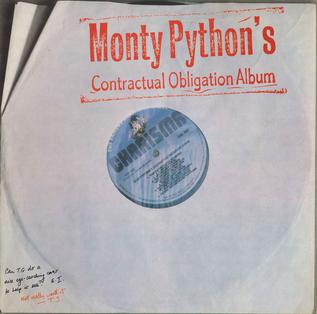
Monty Python's Contractual Obligation Album is the final studio album by Monty Python, released in 1980. As the title suggests, the album was put together to complete a contract with Charisma Records. Besides newly written songs and sketches, the sessions saw re-recordings of material that dated back to the 1960s pre-Python shows I'm Sorry I'll Read That Again, The Frost Report, At Last The 1948 Show and How To Irritate People. One track, "Bells", dates from the sessions for Monty Python's Previous Record, while further material was adapted from Eric Idle's post-Python series Rutland Weekend Television. The group also reworked material written but discarded from early drafts of Life Of Brian, as well as the initial scripts for what would eventually become The Meaning Of Life.

The Instant Monty Python CD Collection is a box set released in 1994 of six CDs containing eight albums by the Monty Python troupe. It does not include the first Monty Python record, Monty Python's Flying Circus, whose rights are still owned by the BBC.
"Sit on My Face" is a short song by the members of the comedy troupe Monty Python which originally appeared on the album Monty Python's Contractual Obligation Album and later appeared on the compilation Monty Python Sings. Written by Eric Idle, the song's lyrics are sung to the melody of "Sing As We Go" (1934) by Harry Parr-Davies, made popular by Gracie Fields. The opening gives way to the voices of The Fred Tomlinson Singers singing "Sit on my face and tell me that you love me." The remaining lyrics contain numerous references to fellatio and cunnilingus, such as "when I'm between your thighs you blow me away" and "life can be fine if we both 69".

Not the Messiah is a comedic oratorio based on Monty Python's Life of Brian. It was written by former Monty Python cast member Eric Idle and collaborator John Du Prez, and commissioned by the Luminato festival.
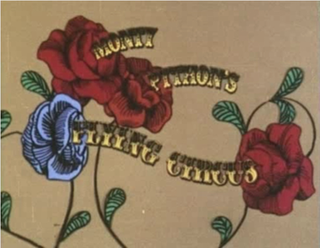
Monty Python's Flying Circus is a British surreal sketch comedy series created by and starring Graham Chapman, John Cleese, Eric Idle, Terry Jones, Michael Palin and Terry Gilliam, who became known as "Monty Python", or the "Pythons". The first episode was recorded at the BBC on 7 September 1969 and premiered on 5 October on BBC1, with 45 episodes airing over four series from 1969 to 1974, plus two episodes for German TV.

The Fairly Incomplete & Rather Badly Illustrated Monty Python Song Book is a compendium of songs by Monty Python, released in 1994 on the occasion of their 25th anniversary. The book contains the lyrics and musical scores for songs from the group's Flying Circus TV series, albums and films. Also included are "The Ferret Song" and "Rhubarb Tart Song", which originate from I'm Sorry, I'll Read That Again before appearing on At Last The 1948 Show. The musical scores were edited by regular Python collaborator, John Du Prez.
References
- ↑ Virgin, Bill (19 March 2008). "On Radio: What Words Can You Say on Radio, TV? Broadcasters Hope Supreme Court Will Clarify Rules". Seattle Post-Intelligencer . Retrieved 29 April 2009.
- ↑ Parker, Alan; Mick O'Shea (2006). And Now for Something Completely Digital. The Disinformation Company. p. 157. ISBN 1-932857-31-1 . Retrieved 29 April 2009.